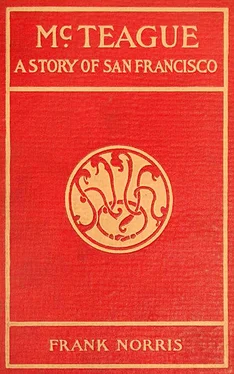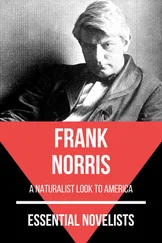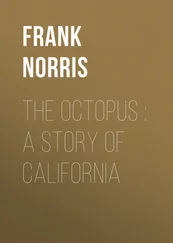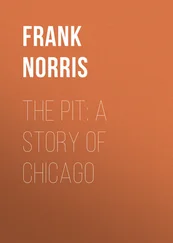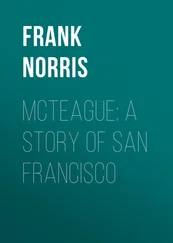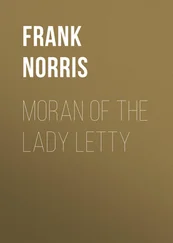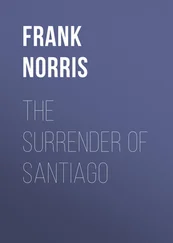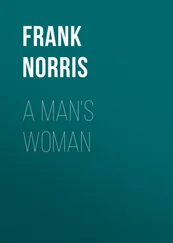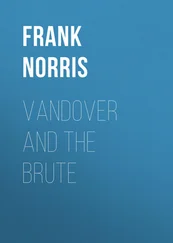Frank Norris - McTEAGUEA Story of San Franciscoby
Здесь есть возможность читать онлайн «Frank Norris - McTEAGUEA Story of San Franciscoby» весь текст электронной книги совершенно бесплатно (целиком полную версию без сокращений). В некоторых случаях можно слушать аудио, скачать через торрент в формате fb2 и присутствует краткое содержание. Год выпуска: 1899, Жанр: Классическая проза, на английском языке. Описание произведения, (предисловие) а так же отзывы посетителей доступны на портале библиотеки ЛибКат.
- Название:McTEAGUEA Story of San Franciscoby
- Автор:
- Жанр:
- Год:1899
- ISBN:нет данных
- Рейтинг книги:5 / 5. Голосов: 1
-
Избранное:Добавить в избранное
- Отзывы:
-
Ваша оценка:
- 100
- 1
- 2
- 3
- 4
- 5
McTEAGUEA Story of San Franciscoby: краткое содержание, описание и аннотация
Предлагаем к чтению аннотацию, описание, краткое содержание или предисловие (зависит от того, что написал сам автор книги «McTEAGUEA Story of San Franciscoby»). Если вы не нашли необходимую информацию о книге — напишите в комментариях, мы постараемся отыскать её.
McTEAGUEA Story of San Franciscoby — читать онлайн бесплатно полную книгу (весь текст) целиком
Ниже представлен текст книги, разбитый по страницам. Система сохранения места последней прочитанной страницы, позволяет с удобством читать онлайн бесплатно книгу «McTEAGUEA Story of San Franciscoby», без необходимости каждый раз заново искать на чём Вы остановились. Поставьте закладку, и сможете в любой момент перейти на страницу, на которой закончили чтение.
Интервал:
Закладка:
It had been on a Wednesday that the scene in the B Street station had taken place. Throughout the rest of the week, at every hour of the day, Trina asked herself the same question: "Do I love him? Do I really love him? Is this what love is like?" As she recalled McTeague — recalled his huge, square-cut head, his salient jaw, his shock of yellow hair, his heavy, lumbering body, his slow wits — she found little to admire in him beyond his physical strength, and at such moments she shook her head decisively. "No, surely she did not love him." Sunday afternoon, however, McTeague called. Trina had prepared a little speech for him. She was to tell him that she did not know what had been the matter with her that Wednesday afternoon; that she had acted like a bad girl; that she did not love him well enough to marry him; that she had told him as much once before.
McTeague saw her alone in the little front parlor. The instant she appeared he came straight towards her. She saw what he was bent upon doing. "Wait a minute," she cried, putting out her hands. "Wait. You don't understand. I have got something to say to you." She might as well have talked to the wind. McTeague put aside her hands with a single gesture, and gripped her to him in a bearlike embrace that all but smothered her. Trina was but a reed before that giant strength. McTeague turned her face to his and kissed her again upon the mouth. Where was all Trina's resolve then? Where was her carefully prepared little speech? Where was all her hesitation and torturing doubts of the last few days? She clasped McTeague's huge red neck with both her slender arms; she raised her adorable little chin and kissed him in return, exclaiming: "Oh, I do love you! I do love you!" Never afterward were the two so happy as at that moment.
A little later in that same week, when Marcus and McTeague were taking lunch at the car conductors' coffee-joint, the former suddenly exclaimed:
"Say, Mac, now that you've got Trina, you ought to do more for her. By damn! you ought to, for a fact. Why don't you take her out somewhere — to the theatre, or somewhere? You ain't on to your job."
Naturally, McTeague had told Marcus of his success with Trina. Marcus had taken on a grand air.
"You've got her, have you? Well, I'm glad of it, old man. I am, for a fact. I know you'll be happy with her. I know how I would have been. I forgive you; yes, I forgive you, freely."
McTeague had not thought of taking Trina to the theatre.
"You think I ought to, Mark?" he inquired, hesitating. Marcus answered, with his mouth full of suet pudding:
"Why, of course. That's the proper caper."
"Well — well, that's so. The theatre — that's the word."
"Take her to the variety show at the Orpheum. There's a good show there this week; you'll have to take Mrs. Sieppe, too, of course," he added. Marcus was not sure of himself as regarded certain proprieties, nor, for that matter, were any of the people of the little world of Polk Street. The shop girls, the plumbers' apprentices, the small tradespeople, and their like, whose social position was not clearly defined, could never be sure how far they could go and yet preserve their "respectability." When they wished to be "proper," they invariably overdid the thing. It was not as if they belonged to the "tough" element, who had no appearances to keep up. Polk Street rubbed elbows with the "avenue" one block above. There were certain limits which its dwellers could not overstep; but unfortunately for them, these limits were poorly defined. They could never be sure of themselves. At an unguarded moment they might be taken for "toughs," so they generally erred in the other direction, and were absurdly formal. No people have a keener eye for the amenities than those whose social position is not assured.
"Oh, sure, you'll have to take her mother," insisted Marcus. "It wouldn't be the proper racket if you didn't."
McTeague undertook the affair. It was an ordeal. Never in his life had he been so perturbed, so horribly anxious. He called upon Trina the following Wednesday and made arrangements. Mrs. Sieppe asked if little August might be included. It would console him for the loss of his steamboat.
"Sure, sure," said McTeague. "August too — everybody," he added, vaguely.
"We always have to leave so early," complained Trina, "in order to catch the last boat. Just when it's becoming interesting."
At this McTeague, acting upon a suggestion of Marcus Schouler's, insisted they should stay at the flat over night. Marcus and the dentist would give up their rooms to them and sleep at the dog hospital. There was a bed there in the sick ward that old Grannis sometimes occupied when a bad case needed watching. All at once McTeague had an idea, a veritable inspiration.
"And we'll — we'll — we'll have — what's the matter with having something to eat afterward in my 'Parlors'?"
"Vairy goot," commented Mrs. Sieppe. "Bier, eh? And some damales."
"Oh, I love tamales!" exclaimed Trina, clasping her hands.
McTeague returned to the city, rehearsing his instructions over and over. The theatre party began to assume tremendous proportions. First of all, he was to get the seats, the third or fourth row from the front, on the left-hand side, so as to be out of the hearing of the drums in the orchestra; he must make arrangements about the rooms with Marcus, must get in the beer, but not the tamales; must buy for himself a white lawn tie — so Marcus directed; must look to it that Maria Macapa put his room in perfect order; and, finally, must meet the Sieppes at the ferry slip at half-past seven the following Monday night.
The real labor of the affair began with the buying of the tickets. At the theatre McTeague got into wrong entrances; was sent from one wicket to another; was bewildered, confused; misunderstood directions; was at one moment suddenly convinced that he had not enough money with him, and started to return home. Finally he found himself at the box-office wicket.
"Is it here you buy your seats?"
"How many?"
"Is it here—"
"What night do you want 'em? Yes, sir, here's the place."
McTeague gravely delivered himself of the formula he had been reciting for the last dozen hours.
"I want four seats for Monday night in the fourth row from the front, and on the right-hand side."
"Right hand as you face the house or as you face the stage?" McTeague was dumfounded.
"I want to be on the right-hand side," he insisted, stolidly; adding, "in order to be away from the drums."
"Well, the drums are on the right of the orchestra as you face the stage," shouted the other impatiently; "you want to the left, then, as you face the house."
"I want to be on the right-hand side," persisted the dentist.
Without a word the seller threw out four tickets with a magnificent, supercilious gesture.
"There's four seats on the right-hand side, then, and you're right up against the drums."
"But I don't want to be near the drums," protested McTeague, beginning to perspire.
"Do you know what you want at all?" said the ticket seller with calmness, thrusting his head at McTeague. The dentist knew that he had hurt this young man's feelings.
"I want — I want," he stammered. The seller slammed down a plan of the house in front of him and began to explain excitedly. It was the one thing lacking to complete McTeague's confusion.
"There are your seats," finished the seller, shoving the tickets into McTeague's hands. "They are the fourth row from the front, and away from the drums. Now are you satisfied?"
"Are they on the right-hand side? I want on the right — no, I want on the left. I want — I don' know, I don' know."
The seller roared. McTeague moved slowly away, gazing stupidly at the blue slips of pasteboard. Two girls took his place at the wicket. In another moment McTeague came back, peering over the girls' shoulders and calling to the seller:
Читать дальшеИнтервал:
Закладка:
Похожие книги на «McTEAGUEA Story of San Franciscoby»
Представляем Вашему вниманию похожие книги на «McTEAGUEA Story of San Franciscoby» списком для выбора. Мы отобрали схожую по названию и смыслу литературу в надежде предоставить читателям больше вариантов отыскать новые, интересные, ещё непрочитанные произведения.
Обсуждение, отзывы о книге «McTEAGUEA Story of San Franciscoby» и просто собственные мнения читателей. Оставьте ваши комментарии, напишите, что Вы думаете о произведении, его смысле или главных героях. Укажите что конкретно понравилось, а что нет, и почему Вы так считаете.
